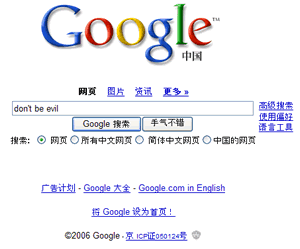 It was with great disappointment and a heavy heart that we heard that Google had compromised their search results in China, excluding results the Chinese government didn’t find acceptable. In effect becoming the government’s censor.
It was with great disappointment and a heavy heart that we heard that Google had compromised their search results in China, excluding results the Chinese government didn’t find acceptable. In effect becoming the government’s censor.
Why would a company whose strap-line was Don’t be Evil do this? The draw of the potential of huge amounts of income in the future has to figure large. The business logic being, if you’re not in China (they’ve been blocked by the Chinese for years), your global future looks less assured.
We suspect that the public reaction around the world, won’t be quite as accepting, as was signaled in the Radio 4’s business interview this morning with Google‘s Senior Policy Counsel, Andrew McLaughlin.
McLaughlin’s attempt to draw parallels between the censorships that they’re required to carry out in Germany for terms around the Nazi’s and their actions in China were slapped down by Greg Wood, the interviewer.
“The situation is different in those countries, because the users of your Web services in countries like Germany, also have some influence in drafting the laws that ban access to Nazi-realted sites, and that’s not the case in China – is It?
McLaughlin’s tell us that they’ve taken a year to develop the idea. We suspect a good deal of that time has been spent trying to figure out how to sell this terrible compromise to their current customers/believers.
We feel this single action has marked the start of the end of the Google-fanatics relationship with the company.
 It’s not that we think that people will stop searching on Google, it’s just that they won’t trust Google implicitly any more
It’s not that we think that people will stop searching on Google, it’s just that they won’t trust Google implicitly any more
Importantly, we feel that if another company came along offering a similar service – which isn’t beyond the bounds of possibility – current Google users will feel a lot less concerned about making the switch.
It’s not like people haven’t change search engines before – remember when nothing but AltaVista existed for search?
It appears that Google now feel that they are so vital to the world that they can act against the wishes of the vast majority of their users. We can’t help but to draw strong parallels to many Western governments of late.
We hate to burst your bubble Google, but the reality is that the World could live with a similar service, and not notice the loss of Google.
Those who don’t like what Google has done, and really want to change their mind have an easy means at their disposal – take away their income.
Where Google would really start to suffer is by Web sites removing their Google TextAds from their sites – and bloggers seem like an ideal start for this.
After all, from their China/censorship actions, it’s clear that Google’s really driven by income. Added to this, we also know that Google isn’t primarily a search engine company, it’s an advertising company. Removing their adverts means to removing their income.
 According to an online survey conducted by brand-meisters Brandchannel.com, Google has held on to its title as the world’s most influential brand in 2005, pushing Apple out of the numero uno spot for the second time this decade.
According to an online survey conducted by brand-meisters Brandchannel.com, Google has held on to its title as the world’s most influential brand in 2005, pushing Apple out of the numero uno spot for the second time this decade.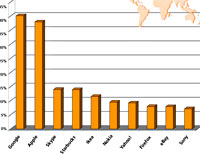 Globally, top honours went to Google, who outflanked brand rivals Apple with an avalanche of punter-pleasing freebies like Google Mini, Desktop and Google Earth, described by Brandreport as, “arguably the greatest thing to hit the Internet since porn” (steady on, chaps!).
Globally, top honours went to Google, who outflanked brand rivals Apple with an avalanche of punter-pleasing freebies like Google Mini, Desktop and Google Earth, described by Brandreport as, “arguably the greatest thing to hit the Internet since porn” (steady on, chaps!).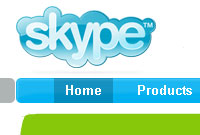 Although Google whipped Apple globally, the company still rules the roost on their home turf, with Steve Jobs’ outfit being declared the leading brand in North America in front of their rivals.
Although Google whipped Apple globally, the company still rules the roost on their home turf, with Steve Jobs’ outfit being declared the leading brand in North America in front of their rivals. It’s a story of booze and beer in the central & Latin America segment, with Corona and Bacardi sitting proud in first and second places respectively.
It’s a story of booze and beer in the central & Latin America segment, with Corona and Bacardi sitting proud in first and second places respectively.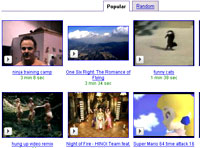 Slapping iTunes around the face with their hefty gauntlet, Google have laid down a challenge to iTunes with the announcement of their new video and television Internet service, the Google Video Store.
Slapping iTunes around the face with their hefty gauntlet, Google have laid down a challenge to iTunes with the announcement of their new video and television Internet service, the Google Video Store. The service promises to “democratise” video sales, letting wannabe Spielbergs sell their movies on Google Video Store, with Google taking what Larry Page has described as a “very low” percentage of the sale cost.
The service promises to “democratise” video sales, letting wannabe Spielbergs sell their movies on Google Video Store, with Google taking what Larry Page has described as a “very low” percentage of the sale cost.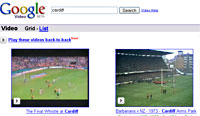 Visitors to the Google Video homepage at
Visitors to the Google Video homepage at 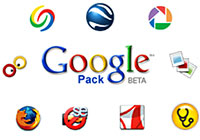 Like a pub drunk wanting to take on the entire world, Google have gone over to Microsoft’s table, knocked over their pints and invited them out for a scrap.
Like a pub drunk wanting to take on the entire world, Google have gone over to Microsoft’s table, knocked over their pints and invited them out for a scrap. Marissa Mayer, VP of search products and user experience at Google commented, “The pack has been created to give users a way to painlessly install all the essential software they need – pre-configured in a sensible way – in a matter of minutes. Better yet, users don’t have to keep track of software updates or new programs – we maintain and update all the software for them.”
Marissa Mayer, VP of search products and user experience at Google commented, “The pack has been created to give users a way to painlessly install all the essential software they need – pre-configured in a sensible way – in a matter of minutes. Better yet, users don’t have to keep track of software updates or new programs – we maintain and update all the software for them.”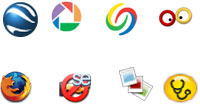 Josh Bernoff, a media and internet analyst at Forrester, a technology research company, described the move as a “direct action to challenge Microsoft,” adding, “Google is saying, ‘We can manage the browser and other elements of the computer-desktop experience better than you’.”
Josh Bernoff, a media and internet analyst at Forrester, a technology research company, described the move as a “direct action to challenge Microsoft,” adding, “Google is saying, ‘We can manage the browser and other elements of the computer-desktop experience better than you’.” After a flurry of rumours and speculation, AOL and Google have announced that they have sealed the deal on an extended partnership deal, which sees Google shelling out $1bn for a 5% stake in AOL.
After a flurry of rumours and speculation, AOL and Google have announced that they have sealed the deal on an extended partnership deal, which sees Google shelling out $1bn for a 5% stake in AOL. Naturally, the synergistic shufflings don’t stop there, with plans being unveiled to make the two companies’ instant messaging tools work with each other and for Google to include AOL video in its video search database.
Naturally, the synergistic shufflings don’t stop there, with plans being unveiled to make the two companies’ instant messaging tools work with each other and for Google to include AOL video in its video search database.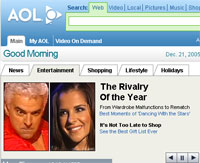 Sitting red faced in the corner and looking like a chump through all of this is Microsoft.
Sitting red faced in the corner and looking like a chump through all of this is Microsoft. Google have thrown the switch on the latest addition to their search results – music.
Google have thrown the switch on the latest addition to their search results – music.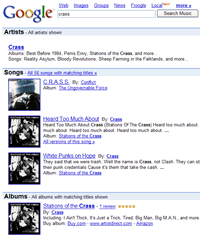 Initial music search results are split down to three sections Artists; Album; Songs. The information available is comprehensive.
Initial music search results are split down to three sections Artists; Album; Songs. The information available is comprehensive. Google is testing a potentially lucrative sales tool that allows users to ring up advertisers located through a Google search – for free.
Google is testing a potentially lucrative sales tool that allows users to ring up advertisers located through a Google search – for free.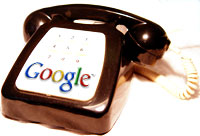 Moreover, they claim that the number will be blocked from the advertiser during the call, with Google promising to delete the number from their servers after a short period of time.
Moreover, they claim that the number will be blocked from the advertiser during the call, with Google promising to delete the number from their servers after a short period of time.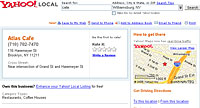 Using search engines has become the second most popular activity for Web users, according to new research from the Pew Internet & American Life Project.
Using search engines has become the second most popular activity for Web users, according to new research from the Pew Internet & American Life Project.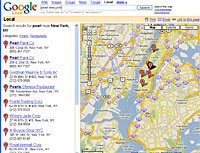 ‘Gen X’ surfers (29-40 year olds, not the Billy Idol-fronted band) were online the most (51 per cent), followed by ‘Gen Y’ users (18-28 year olds), ‘Older Baby Boomers’ (51-59 yrs old), ‘Younger Baby Boomers’ (41-50), ‘Matures’ (60-69) and, finally ‘After work’ (70+). We wonder who makes up these daft categories?
‘Gen X’ surfers (29-40 year olds, not the Billy Idol-fronted band) were online the most (51 per cent), followed by ‘Gen Y’ users (18-28 year olds), ‘Older Baby Boomers’ (51-59 yrs old), ‘Younger Baby Boomers’ (41-50), ‘Matures’ (60-69) and, finally ‘After work’ (70+). We wonder who makes up these daft categories?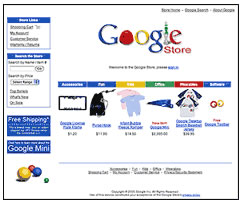 Always remember, Goggle may look like a search engine company, but it is, in fact, an advertising company.
Always remember, Goggle may look like a search engine company, but it is, in fact, an advertising company.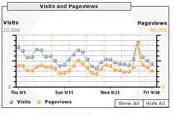 The history
The history We thought that it was worthwhile breaking out the following information that we gain in researching two article;
We thought that it was worthwhile breaking out the following information that we gain in researching two article;